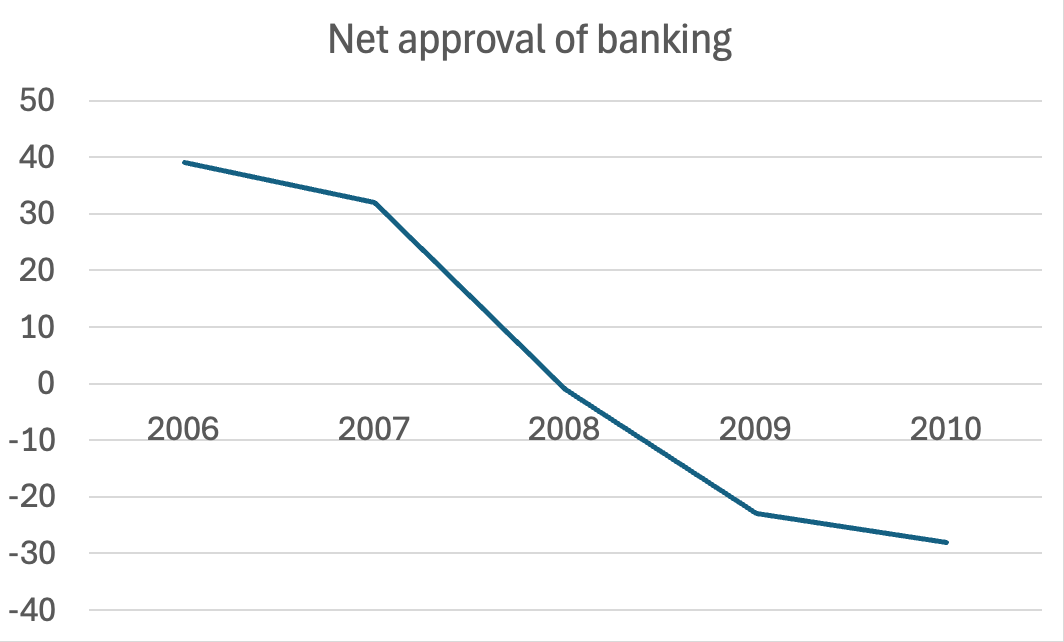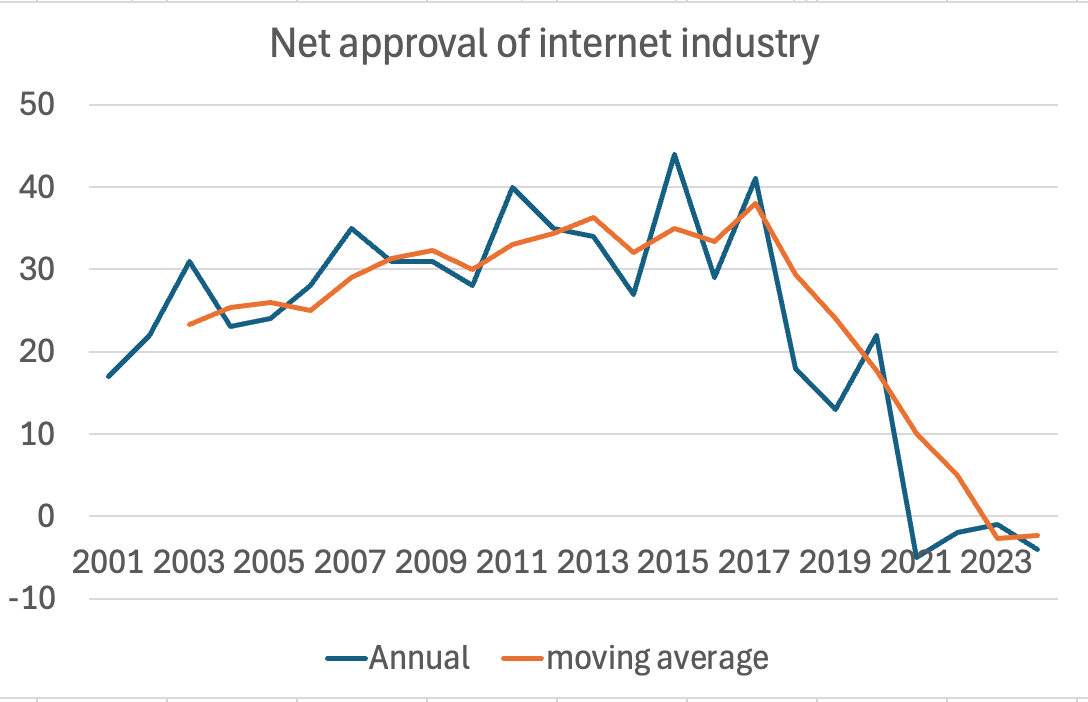Enshittification and the Bitterness of Billionaire Bros
Hell hath no fury like a tech god scorned
One of the many weird, ugly developments in these weird, ugly times has been the MAGAfication of a number of Silicon Valley billionaires. In a fully functional democracy the views of a handful of people with anti-democratic ideas wouldn’t matter. But we live in a corrupted democracy in which wealth buys power, so when people who accumulated vast fortunes largely thanks to U.S. scientific preeminence begin backing a deeply anti-scientific movement, it matters quite a lot.
Silicon Valley used to be generally pro-Democratic. So did the Biden administration mishandle its relationship by starting to impose some regulation on the industry?
I don’t think so. The actual regulations imposed during the Biden years wouldn’t have significantly reduced industry profits and were weaker than those in Europe. But the industry was right to see them as a harbinger of more regulation to come, because the public, which used to have a highly favorable view of tech and its leaders, had lost faith.
The thing is, the tech bros haven’t just turned right. Many of them are filled with rage — that special kind of rage exhibited by men who enjoy vast privilege and can’t abide any suggestion that their privilege is unjustified.
I’ve written about this before, but am revisiting the subject for a couple of reasons. One is that I discovered some new data, which I’ll show shortly. Another is that I realized that we’ve seen a version of this movie before.
Do people still remember “Obama rage”? Circa 2010 Wall Street titans — who had become accustomed to being seen, to use Tom Wolfe’s phrase, as Masters of the Universe — erupted in anger over what they insisted was a lack of respect from the Obama administration. Obama had bailed them out, on very generous terms, but he had the temerity to suggest that the industry bore some responsibility for the financial crisis that made bailouts necessary.
Were the Masters of the Universe really that angry over Obama calling them “fat cats”? Or was their outrage performative, aimed at heading off tighter financial regulation? Yes.
Wall Street had good reason to fear increased regulation — in fact, it did face tighter regulation after the passage of the Dodd-Frank financial reform bill. And the climate of public opinion had turned decisively against finance. Every year Gallup asks for public evaluations of a number of industries. Here’s what happened to views of the banking industry during the runup to Obama rage:
Source: Gallup
In these circumstances, Obama rage served a strategic purpose. In a political system corrupted by money, vehement denunciation of anyone criticizing Wall Street was a warning shot across the bow of politicians considering further regulation. And Wall Street went strongly for Mitt Romney in 2012.
But that doesn’t mean that the rage was fake. On the contrary, nothing makes a privileged man angrier than criticism of his privilege.
The story of Big Tech’s right turn is basically similar, although it was both more gradual and ultimately more extreme.
The Biden administration made some efforts to regulate tech. In part this reflected a perception that the big players had turned their focus from innovation to exploiting their locked in customer bases — a process memorably described by Cory Doctorow as enshittification. In part it represented growing awareness of the psychological and social harm often associated with internet use.
And like Wall Street tycoons a decade or so earlier, tech bros responded with rage. Was this rage performative, a warning to politicians who might be tempted to support regulation? Or was it genuine outrage at the idea that anyone might criticize their brilliance and benevolence? Yes.
Like Wall Street earlier, tech had genuine reason to fear increased regulation, because — probably as a result of enshittification — it no longer had the broad public support it once enjoyed:
Source: Gallup
Note that annual data are noisy, so I’ve also smoothed it out by taking three-year moving averages. But the point is clear: The tech industry, and presumably its leaders, reached a peak of public adulation around 2015-16, and have since lost their aura.
So performative outrage, as a warning shot to politicians, makes sense. But that doesn’t mean that the rage isn’t real. In a recent interview Henry Farrell, who has been writing about the changing political culture of the Silicon Valley elite — and who I’ll be interviewing myself soon — pointed out that “There's a feeling among Silicon Valley elites that [during the Biden years] they did not get the respect that they purportedly deserve.”
If there’s a difference from the Obama rage story, it’s the extremely exalted position tech used to hold in public discourse — but doesn’t hold anymore. Farrell:
When I said that there was a lack of respect, I think that this involves changes in the broader conversation. Over the last number of years, Silicon Valley CEOs and venture capitalists have been treated with a significant degree of worship by the United States press — until around 2015-2016.
If Silicon Valley people wanted to pronounce on something, their grand statements were treated with enormous respect by the press. They had entourages, as if they were presidents. Mark Zuckerberg and other people were deemed by many to be world historical figures.
Now that’s all gone. And the tech bros’ rage over the loss of their aura is real.
But here’s the crucial point: Their rage wouldn’t matter if their wealth weren’t so vast and we didn’t have a political system so corrupted by money. In a more equal society with a less corrupted democracy, people expressing the views we’re hearing from the likes of Peter Thiel or Marc Andreesen would be treated as cranks. In fact, they’d probably be hiding their opinions.
If we now have a political discourse that prominently features crazy ideas, it’s because we have a political system that has made some crazy people incredibly wealthy and lets them translate that wealth into power.
MUSICAL CODA




It must be noted that vast wealth makes people crazy. Surrounded by sycophants, unrestricted by normal social inhibitions, people develop enormous and infantile egos. They think they’re gods. Their perfect access to every pleasure and indulgence eventually renders all these pleasures meaningless. They’re bored and jaded. So all that’s left for them is to exercise power, compete with one another for the most toys or zeroes, or if they’re really nasty, inflict pain. And they do know their hoarding is hurting everyone else. So they need to construct a powerful self-justification (I’m superior, I’m transformative, I’m going to survive the apocalypse and you’re not!). The vast carelessness Fitzgerald described is more like a vast sociopathy.
Bingo. Our last best hope is to get money out of politics. The sooner the better. It seems a lost cause, but American Promise is working on a constitutional amendment that could do just that.